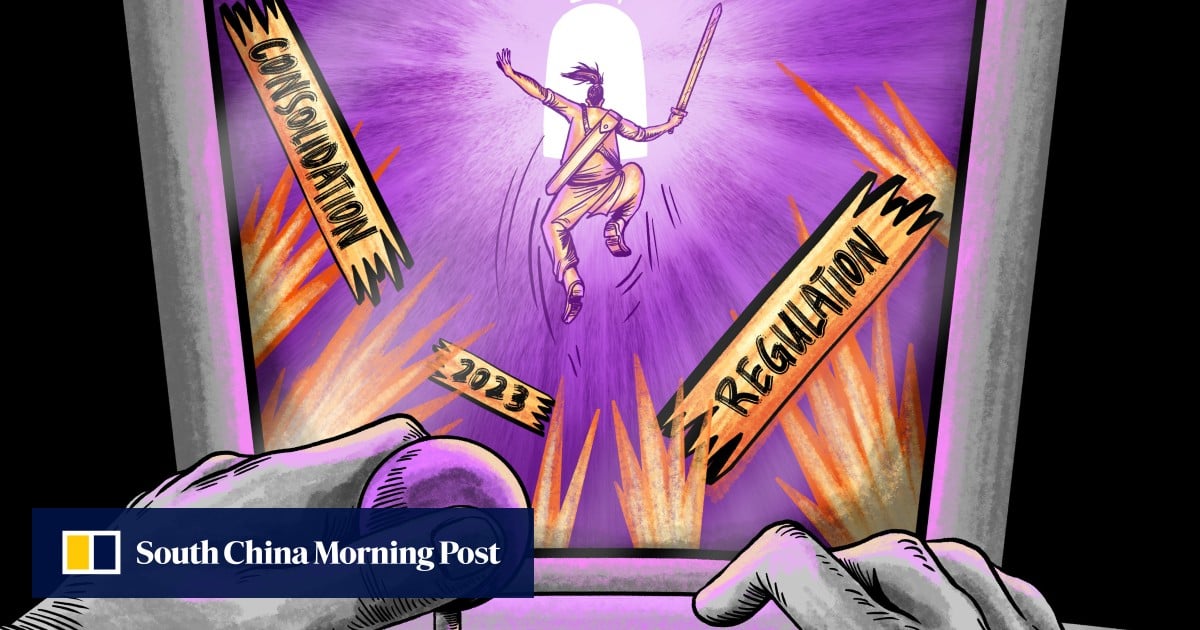
13 Jan China’s video gaming market ended 2023 battered and bruised, but can world-beating titles and innovation save the day?
The total number of video game players in China has been peaking.
By the end of 2023 there were 668 million gamers in China, a tiny increase from the 666 million at the end of 2022. They jointly spent 303 billion yuan (US$42 billion) on games, or about US$63 per gamer last year – roughly a quarter of the amount spent by US gamers.
The biggest revenue-generating mobile game in 2023 remained Honour of Kings, released by Tencent Holdings in 2015.
Amid an increase in regulatory oversight in recent years, China’s video gaming market has, in some ways, become walled off like the country’s television market.
Censors scrutinise content and control licence approvals, and domestic gaming studios – including Tencent and NetEase – are increasingly expected to deliver Chinese “social values” with their titles. Meanwhile, the companies need to maintain an uneasy balance between maximising revenue for shareholders and protecting minors from gaming addiction.

Video gaming, once seen as a gold mine in China’s internet sector, was also hard hit by lay-offs and closures in the past year, according to industry insiders and executives.
“Every studio that I know is cutting costs, even industry leader Tencent,” said Mark Wu, who works for a gaming studio in Guangzhou, capital of southern Guangdong province.
But does this herald another barren year for China’s video game market or is it just a much-needed bout of consolidation and recalibration for an industry that has been subject to wild swings of investment in recent years?
Earlier this month, the gaming unit of Tencent launched a “spring bamboo shoots” initiative to support low- and medium-budget projects, in a change from a previous focus on projects with heavy production costs, according to industry blog Youxiputao. Tencent did not immediately respond to a request for comment.
China’s Christmas gift to game developers: 105 approved titles, the most all year
China’s Christmas gift to game developers: 105 approved titles, the most all year
However, China-backed games continue to make headlines around the world.
In December The Game Awards (TGA) named Baldur’s Gate 3, created and published by Tencent-backed Belgian developer Larian Studios, as video game of the year. Another nominee for the award was Alan Wake 2, from Remedy Entertainment and published by Epic Games, both backed by Tencent.
Shanghai-based miHoYo – which cracked the global video games market with its hit title Genshin Impact in 2021 – saw its Honkai: Star Rail win TGA’s best mobile game and Apple’s iPhone game of the year in 2023.
Analysts expect Chinese studios to roll out more hits in 2024, although it remains to be seen whether the content will match up with Beijing’s desire for “excellent” video games that promote socialist values, highlight Chinese culture and demonstrate the country’s advanced technology.

“In coming years, China’s gaming industry will be focused on producing premium titles and overseas expansion,” said Zhang Shule, an analyst with CBJ Think Tank. “Local developers are expected to step up R&D efforts to make quality games, drawing on their experience and success in the domestic market.”
In another bright spot, it appears China is set to welcome the massively-popular World of Warcraft back, after developer Blizzard struck a new deal with old partner NetEase, according to a report by domestic media outlet 36Kr.
CBJ’s Zhang said that while there is still uncertainty about the “remarriage”, NetEase “does stand out in a crowd of options”. “Its experience from the last tie-up and operational edge will be a strong draw.”
Chinese mobile game user spending in 2023 remained at a level similar to that of 2022, as the market saw an influx of new titles with more games obtaining licences from authorities, according to Nan Lu, director of Asia-Pacific marketing at research firm Sensor Tower.
Similar spending levels have been recorded in overseas markets, such as the US, South Korea and Southeast Asia in the past year. Still, Sensor Tower has observed a gradual increase in global user spending since the Christmas and 2024 New Year holiday. “Overall, the overseas market continues to offer opportunities for Chinese developers in the coming years, especially those focused on hybrid casual genres,” added Lu.
According to data from the Game Publishing Committee of the China Audio-Video and Digital Publishing Association, the semi-official industry association, overseas revenue from China video game titles dropped 5.7 per cent in 2023 to US$16.3 billion.
Meanwhile, China’s video games industry is not an island and faces the same headwinds as the wider economy – namely weak domestic consumption amid an unsteady, post-pandemic recovery.
Matthew Chen, co-founder and chief operating officer of Chengdu-based Zencat Gaming in southwestern Sichuan province, said that players in China “are not spending that much money amid a slowing economy”.
UBS analyst Christine Peng said this week that heightened fears among consumers about salary cuts and job security have dragged down retail sales growth in the world’s second-largest economy. The Swiss bank expects China’s retail sales to climb 5.5 per cent in 2024, one percentage point lower than the estimated 6.5 per cent rise last year.
China to curb excess spending on video games in blow for world’s biggest market
China to curb excess spending on video games in blow for world’s biggest market
Wu, the Guangzhou-based video games worker, said that the end of strict pandemic controls in late 2022 led to some good signs in the first few months, but added “demand for gaming [subsequently] gave way to the need [to spend] on necessities”.
Meanwhile, the overall tone of policy towards the industry remains uncertain. As things stand, all online video games must go through rigorous screening to obtain licences before being released to the public and monetised, and all players are required to have real-name registration.
Earlier this week, Tencent announced its winter policy for players aged under 18 – they can only play its games online for a combined 16 hours between January 22 and February 24. The rule is designed to comply with Beijing’s 2021 move to impose a play time ceiling for minors.

But while Beijing has toned down its overall view of video games as “spiritual opium”, the industry was rocked at the end of last year when regulator the National Press and Publication Administration (NPPA) proposed in a draft rule that games must not offer rewards that entice people to spend excessively, such as for daily logins and funding top-ups.
The timing and severity of the proposed rule change dealt a fresh blow to already-fragile investor confidence in Chinese stocks. NetEase, the country’s No. 2 gaming operator, fell by nearly a quarter in a single trading day, with Tencent dropping over 12 per cent.
Zeng Xiaofeng, vice-president of industry research firm Niko Partners, expects the rule change – if passed in its present form – to hit titles that rely heavily on loot boxes for monetisation or incentives for user acquisition, and those that have a large number of high spenders.
Popular games like Tencent’s Honour of Kings and NetEase’s Eggy Party are less likely to be impacted, as both have relatively low average revenue per user, according to Niko Partners.
Around 26 per cent of China’s mobile game users are payers, while high spenders – which refers to players that spend 300 yuan (US$42) monthly – only account for 2.5 per cent of mobile gamers in China, according to Niko Partners.
However, in the wake of the market rout triggered by the NPPA’s action, Beijing attempted to limit the damage by stating its desire for “healthy” development of the industry.
As ByteDance retreats in video games, miHoYo claims global wins with new title
As ByteDance retreats in video games, miHoYo claims global wins with new title
And Beijing approved 105 new video game licences in December, the most in 17 months. In 2023 the regulator issued 1,075 licences for domestic and foreign games, more than double the number in 2022. 98 imported titles also received the greenlight in 2023, up from 44 in 2022, and Niko Partners expects another increase this year.
CBJ’s Zhang says that in terms of innovation, local developers are likely to “leverage augmented and virtual reality equipment and software” as well as “artificial intelligence (AI) to make the same game playable across different platforms – mobile, desktop and consoles – for a more immersive gameplay experience”.
Meanwhile, many of the industry workers the Post interviewed have used generative AI, the technology popularised by OpenAI’s ChatGPT, to produce various gaming content, including text, images and video.
Zencat Gaming’s Chen said that the use of AI tools to modify pictures, generate video and dub animated characters can cut the costs of overall video game development by roughly 20 per cent.
This can be a double-edged sword though. As Wu, the Guangzhou-based industry worker pointed out, while the new technology can be a “great assistant” it may very well kill entry-level jobs.
